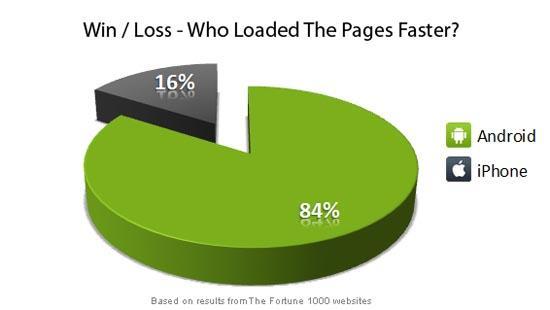
Everybody wants a speedy Web browsing experience on their smartphone and, according a recent study from Blaze Software, in a browsing battle between Android and iOS, Google's platform is the way to go. Blaze used an iPhone 4 on iOS 4.3 and a Nexus S on Android 2.3 and subjected them to loading 1,000 websites 45,000 times over a WiFi connection, using custom-developed apps that were made to measure browser speed. After the dust settled, the firm found Android's browser was 52 percent faster than the iPhone's, the former finishing with an average load time of 2.144 seconds and the latter claiming a median load time of 3.254 seconds. You can check out the full press release from Blaze below.
While Blaze's test does sound pretty thorough, it's likely that most users won't really notice a difference of a second, especially if they don't have two devices side by side like Blaze's testers did. It's also worth noting that, as pointed out by The Loop, only Safari can benefit from iOS 4.3's JavaScript boost as of this writing. It'd certainly be interesting to see a new test comparing iOS 4.3's Safari browser against Android 2.3's version of Chrome, although it's entirely possible that we'd still see a pretty negligible difference in the outcome. What do you all make of Blaze's tests? For anyone that's had the pleasure of using both Gingerbread and iOS 4.3, which browser do you think has the edge in speed?
UPDATE: Blaze has taken back it findings, explaining that they didn't know that iOS 4.3's JavaScript enhancements wouldn't extend to their custom app. The full statement from Blaze CTO Guy Podjarny:
"This test leveraged the embedded browser which is the only available option for iPhone applications. Blaze was under the assumption that Apple would apply the same updates to their embedded browser as they would their regular browser. If this is not the case and according to Apple's response, it's certainly possible the embedded browser might produce different results. If Apple decides to apply their optimizations across their embedded browser as well, then we would be more than willing to create a new report with the new performance results."